38+ Sample Goal Statement Templates
-

Sample Goal Statement Template
download now -
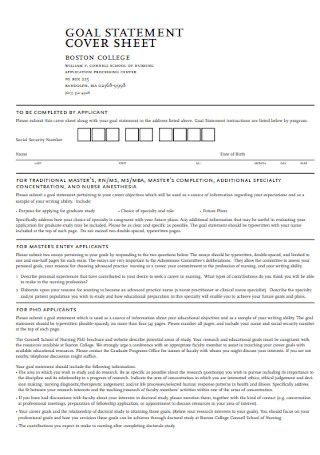
Goal Statement Cover Sheet
download now -

Professional Goal Statement
download now -
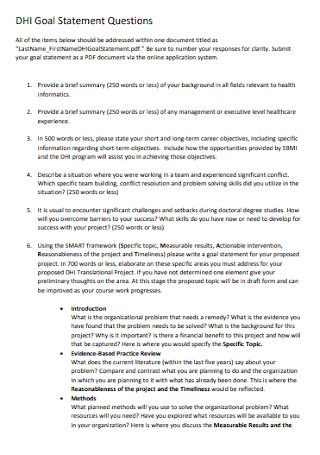
Goal Statement Questions Template
download now -

Professional Goal Statement Cover Sheet
download now -
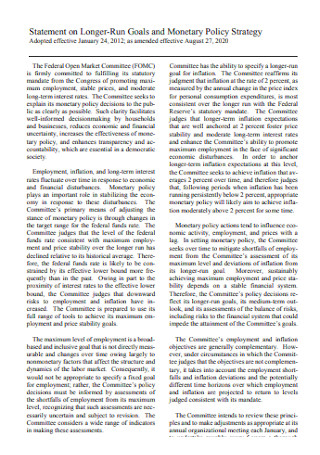
Statement on Longer-Run Goals
download now -

Personal Goal Statement
download now -

Goal and Objective Statements
download now -

Teaching Goal Statement Template
download now -
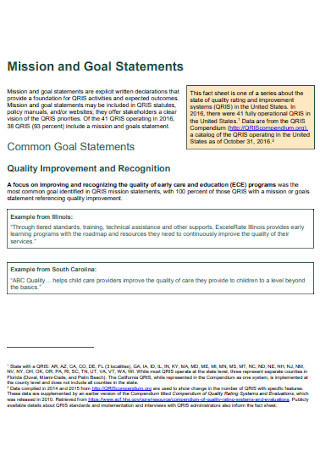
Mission and Goal Statements
download now -

Smart Goal Statement
download now -

Student Goal Statements
download now -
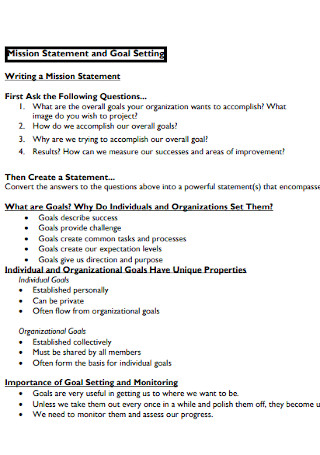
Mission Statement and Goal Setting
download now -

Vision and Goal Statement Template
download now -

Goal Statement Form
download now -

Career Goal Statement
download now -

Program Goal Statement
download now -

Formulating Goal Statements
download now -

Comprehensive Goal Statement
download now -

Goal Statement Worksheet
download now -

Sample Smart Goal Statement
download now -
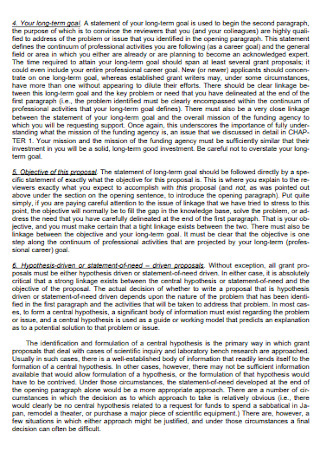
Long Term Goal Statement
download now -

Career Goal Statement Example
download now -

Student Learning Goal Statement
download now -
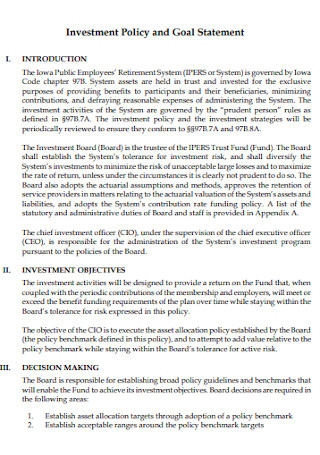
Investment Policy and Goal Statement
download now -
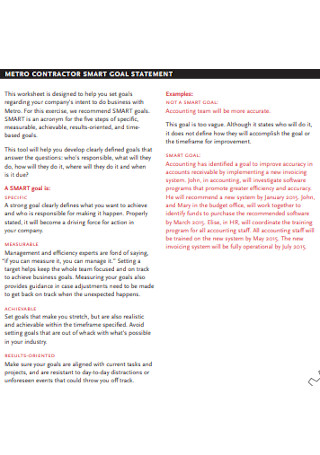
Metro Contractor Goal Statement
download now -

Introduction and Goal Statements
download now -

Goal Statements Format
download now -

Leadership Goal Statement Template
download now -

School Outcome Goal Statements
download now -

Statement of Goals for Engineering Education
download now -

Standard Goal Statement Template
download now -

Goal and Objective Statement Example
download now -

Internship Program Goal Statement
download now -
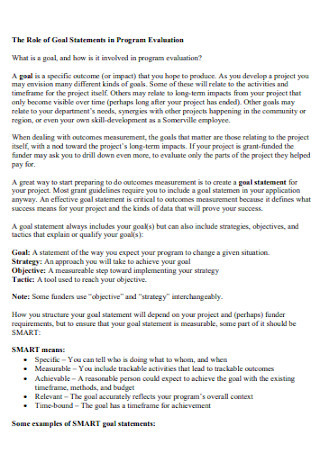
Goal Statements in Program Evaluation Template
download now -

Goal Statements for Employees
download now -

Personal Goal Mission Statement
download now -

Residency Program Goal Statement
download now -
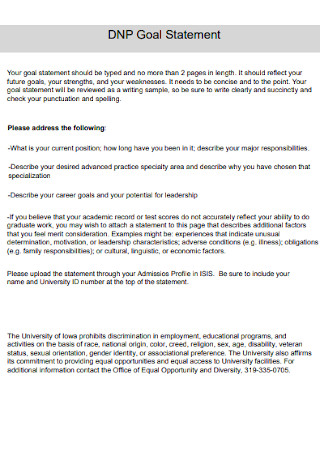
Professional Goal Statement Example
download now
What Is a Goal Statement?
The goal statement is the first plan you use to plot your goals, whether it is a personal, professional, or any type of goal. And this statement keeps you determined to achieve your plans without fail. The benchmark of goal statements is to be well-defined, carefully structured, and attainable. It is more than just stating your goals since you also acknowledge the overall purpose, the possible outcome, and the list of tasks to fulfill. No matter how it is formed, what matters most is that the goal statement keeps you successful, so every time and effort given will not go for naught.
The National Center for Education Statistics (NCES) reported that the US had over 130,930 K–12 schools as of 2017–2018.
Meanwhile, there are around 1.5 million nonprofit organizations that are officially registered in America.
On another note, The Business Journals confirmed that the US garnered around 32.5 million businesses.
Why Are Goal Statements Important?
Goal statements are essential since they predict how bright your future is, especially when you have a smart plan and continue to commit to it. Also called an aim statement, the goal statement is the effective framework for envisioning your career goal, academic plan, research, and more. Hence, goal statements are not limited to careers or personal lives since you could always associate goals in customer service, internship, graduate program, financial plan, etc. And besides having a direction, goal statements also help you ask important questions and learn about accountability, which you will experience on your goal-driven journey.
The Elements of a Goal Statement
Since you already know the meaning and importance of goal statements, your next trip is to discover what makes up such statements. Generally, six major elements should be included in a goal statement. And these are the following:
SMART Characteristics of Goal Statements
You deserve to be guided in setting a goal. And you can do that by adding SMART goals, which refer to specific, measurable, attainable, relevant, and time-based goals. Goal statements must have these qualities since they help increase the success rate of reaching the desired results. Without further ado, learn more about the SMART characteristics of goal statements.
Specific
Yes, detailed documents of a goal statement are good. But not to the point where everything has gotten wordy already. Take out irrelevant information and focus on setting specific goals instead. For example, you might plan on making goals for education. That sounds too broad, considering there are around 130,930 K–12 schools in America. Be straightforward to lessen confusion, like making goals for one student in high school.
Measurable
You must have targeted results by clearly stating what you need to accomplish in the first place. Otherwise, lacking measurable goals lets you lose track of what you need to work on. Measuring plans also involves finding out when they may be finished. For example, the National Center for Charitable Statistics (NCCS) mentioned that the US has about 1.5 million registered nonprofit organizations. So what is the target of your nonprofit that is different from other organizations out there? Work on that.
Attainable
Another problem is when you have extravagant goals that are out of your reach. Be realistic, too, by considering goals that are attainable or practical. Take business, for example. The Business Journals research survey told us that 32.5 million businesses exist in America. As one business manager from that demographic, you might be looking for ways to make your company as competitive as possible immediately. But maybe you have not considered your resources, budget, and plans yet. Hence, reaching your goal still takes time.
Relevant
Are you making goals that are relevant to you or others? Think of that question carefully because maybe nobody gets benefited from the outcome, even when you are fully committed to such plans. With every task or approach listed in a document, think about why they matter. That way, you will slowly conclude whether those statements are relevant or not.
Time-Based
Never forget to incorporate a timeframe in the making. Set schedules on when to fulfill certain tasks and approaches from the goal statement. And it would be best if you have a deadline for completing each item. Why is this characteristic important? Many well-written plans remain as plans because of not being conscious of the time for accomplishing tasks. It is much better to be punctual to have more room for new goals when you achieve everything soon.
How to Create a Goal Statement
Now, are you ready to make your own goal statement? Don’t fret. The process is not as difficult as you might think, especially when we laid out the proper steps to accomplish it. Also, you won’t have to start from scratch. Check out our sample templates of goal statements. Just pick your preferred template, edit the content, and download—easy as pie! And to ensure your goal statement really pays off, please follow these steps:
Step 1: Know Your Purpose
The first step in making goal statements is to understand your purpose. For example, are you making a goal statement for your journey as a college teacher or as a small business manager? When you know the reason for the need to create goal statements, the rest of the flow naturally comes off easily. And you should tailor your goal statement’s content according to that purpose. Otherwise, it is pointless to make goal statements for a teacher’s unit plans if you were supposed to cover a manager’s project plans.
Step 2: Identify the Elements of Goal Statements
Refer back to the goal statement’s elements discussed earlier. You must add those elements one by one from the outcome to the conditions. And you can always use easy words like simple action verbs in writing goals. As long as the statements are direct to the point, easy to understand, and properly structured, rest assured, the outcome will be excellent. Also, identifying the elements does not mean you memorize the six names of the goal statement’s elements. You determine how those elements will work according to your purpose. For example, you specifically enumerate the beneficiaries’ names rather than just saying your goal statement is for the beneficiaries.
Step 3: Incorporate the SMART Characteristics
Of course, you have to ensure your goal statements meet the SMART characteristics, which were also discussed above. The specific, measurable, attainable, relevant, and timely characteristics mark a goal statement’s essential qualities anyway. So one by one, you evaluate if you meet the five criteria. After your assessment, determine if you are already satisfied with the statement’s outcome. In fact, you can always ask for extra help from other people concerned with such goals. Having more minds to work with can build greater goal statements for sure.
Step 4: Polish Your Whole Work
From the goal statement’s format, design, content, and overall presentation, review accordingly. Maybe you are too confident that everything is prepared; thus, you launch your goal statement that still contains some errors. The key is to review and polish everything. You can have other experts look at your statement and have them edit some details. Be ready for some feedback. You don’t need to be ashamed for some critiques anyway since what matters is that the final goal statement will not be faulty.
FAQs
What is a vision statement?
Vision statements outline the desired outcome of a company or organization. In short, they ask for the bigger picture of anything you wish to accomplish.
What is a mission statement?
A mission statement focuses on defining an organization’s purpose, objectives, and steps to accomplish goals. It provides the general statement of the approaches or how you fulfill the vision.
What are the types of goals?
Generally, there are three main types of goals. They are the process, performance, and outcome goals.
Have you ever felt like you are going in circles? Or, to be specific, a moment where you can see that your business, organization, or career has not accomplished that much for a long time? If yes, then set some new goals! The issue might be you have not fully decided or thought about where you need to be. Or perhaps, you have no proper roadmap on how to reach your desired result. Thus, start listing what you need to accomplish and learn how to achieve them slowly. And that is just what our sample goal statement templates are for. Download now!
